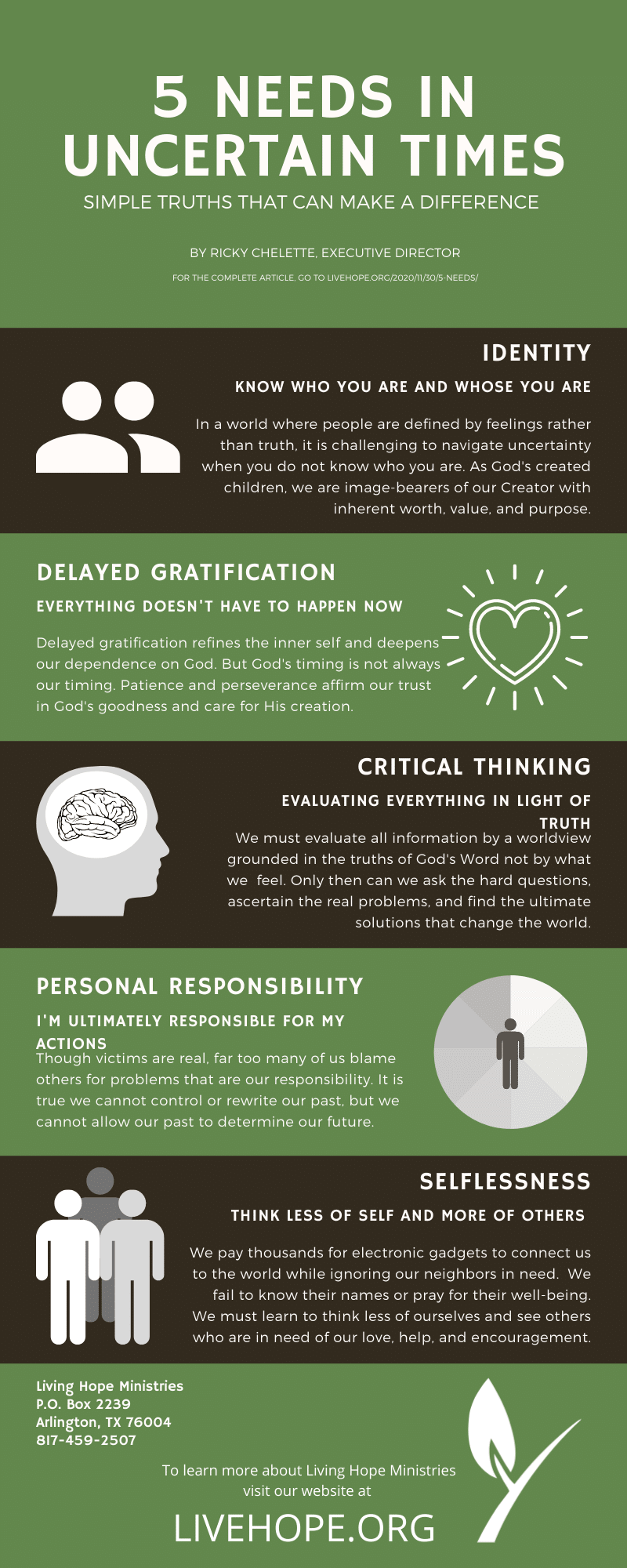by Ricky P. Chelette, Executive Director
These COVID days have caused me to think deeply about the conversations I have had with many young adults. The uncertainty of their future, the instability of things once believed stable, and the pandemic’s isolation and fear create tensions for which they are ill-prepared to cope. I want to think they are unique in these tensions and struggles, but the truth is, we all are experiencing difficulties, questions, and tensions beyond our ability to cope.
However, we are not without hope. God not only knew we would be in this “unprecedented moment,” but He knows what life will be like on the other side of it. He is with us, and He will see us through. In the meantime, we need to use these moments to grow our relationship with Him and with those around us.
Below are five needs I see continually emerging in these uncertain times.
- A need for an enduring sense of identity. In a world where people are defined by feelings rather than truth, it is challenging to navigate uncertainty when you do not know who you are. As God’s created children, we are image-bearers of the Creator. We are not defined by the whim of feelings and circumstances but by an eternal, unchanging, and loving Father who created us with purpose and intentionality. We are His beloved, and He gave His life for our redemption. Circumstances cannot define us, but His act of creation does. We must embrace our imaging-bearing self in all its splendor. (Genesis 1:27; 1 Peter 2:9; 1 John 3:1-2).
- A need to embrace delayed gratification. In a world of instant everything, it isn’t easy to wait. We want what we want when we want it. But delayed gratification refines the inner self and deepens our dependence on God. Though God promises to “work all things together for good to those who love Him and are called according to His purpose (Rom. 8:28),” He gives no timeline as to when that will take place. Abraham waited twenty-five years for a promised son, and the children of Israel waited 40 years to enter the promised land. Waiting is an aspect of maturing which allows the result to be all the more appreciated. (for a Psychology Today article on the benefits of delayed gratification, click here) (2 Corinthians 4:17; Psalm 37:7-9; Philippians 4:6).
- A need to think critically. In an age where Google has become our brain, we need to think critically about the information we receive. Newsfeeds, Twitter, TicToc, Snapchat, and social influencers are continually telling us what to believe, think, and even feel. But each of these outlets has a position and a point of view they wish to move forward. We must evaluate all information not by what we think or feel about it, but by a worldview grounded in the truths of God’s Word. Only then can we ask the hard questions, ascertain the real problems, and find the ultimate solutions that change the world. (1 John 4:1; 1 Thessalonians 5:21; Acts 17:11).
- A need to take personal responsibility. Today, everyone seems to be a victim. Though victims are real, and many are experiencing ills imposed upon them by individuals or situations for which they had no control, far too many want to blame others for problems that are their responsibility. We cannot control or rewrite our past, but we cannot allow our past to determine our future. American and Christian history record the stories of incredible men and women who overcame hardships to accomplish amazing things for God and mankind because they took personal responsibility for their futures. They refused to allow the past to dictate their destiny. After he denied Jesus three times, Peter became the great evangelist, seeing thousands of people accept Christ as Savior. After multiple failures at winning public office, Lincoln became one of the most significant presidents in American history. Despite her sordid past, the woman with the alabaster jar of whom Jesus stated, “Therefore I tell you, her sins, which are many, are forgiven—for she loved much” ( Luke 7:14), became a devoted follower of Jesus. God has allowed us to start a new script for our lives today, but we must surrender to Him and take responsibility for our actions and decisions. (Genesis 3:9-24; James 1:14; Ezekiel 3:18)
- A need to think less of self and more of others. It is far easier to get a “like” than to be likable in real-life relationships. In a world where “selfies” have become big business, and “personal branding” has become a multibillion-dollar industry, it is easy to see how we forget others’ image-bearing reality and concentrate only on our personal satisfaction, popularity, and pleasures. Porn becomes permissible because it satisfies me while ignoring the sex-trafficking it supports, the disregard for other humans it reinforces, and the corruption of holy sexuality it exploits. We pay thousands for electronic gadgets to connect us to the world while ignoring our neighbors in need. We fail to know their names or pray for their well-being. We must learn to think less of ourselves so that we can think more of others. (Romans 13:9-11; 15:1-3; Philippians 2:3-4; 1 Corinthians 10:24,33).
These five needs are not exhaustive nor unique to the current generation, but applicable to all of us on some level. I am thankful that God is neither surprised nor shocked by our current situation, regardless of how “unprecedented” it may appear. I am thankful that He is still on His throne, still the sovereign Lord, and still delaying His return so that more may come to know Him, trust Him, and find their identity and hope in Him. May we take this time to be thankful, grateful, and grow in our relationship to Christ and others. May we examine our own lives to see how we are doing in each of these five areas and seek the Father to make whatever changes He prompts. As we grow, may we share His love with those who need to experience the gospel and discover the One who meets us in our neediness and brings wholeness and peace. He, indeed, is the Way, the Truth, and the Life!


